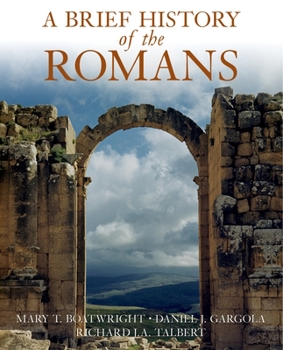A Brief History of the Romans
Select Format
Select Condition 
Book Overview
How did a single village community in the Italian peninsula eventually become one of the mightiest imperial powers the world has ever known? This question is the focus of A Brief History of the Romans, an abbreviated version of the highly acclaimed The Romans: From Village to Empire by Mary T. Boatwright, Daniel J. Gargola, and Richard J.A. Talbert. This shorter version lucidly unfolds Rome's remarkable evolution through monarchy, republic,...
Format:Paperback
Language:English
ISBN:0195187156
ISBN13:9780195187151
Release Date:January 2006
Publisher:Oxford University Press, USA
Length:352 Pages
Weight:1.42 lbs.
Dimensions:0.8" x 9.1" x 7.4"
Customer Reviews
1 rating
Definitive Work On Rome
Published by Thriftbooks.com User , 16 years ago
I read this book for a graduate course in Roman history. This is a good book surveying Roman history, an easy read One of the most important relationships is that of the Roman family and household. The state structure is based on this. Senate is head of Patrician families and act as fathers of Rome, in charge of morality, etc, especially in the Republican era. The basic units of Roman society were households and families. Households included the head (usually the father) of the household, paterfamilias (father of the family), his wife, children, and other relatives. In the upper classes, slaves and servants were also part of the household. The head of the household had great power (patria potestas, "father's power") over those living with him: He could force marriage and divorce, sell his children into slavery, claim his dependents' property as his own, and even had the right to kill family members (though this last right apparently ceased to be exercised after the first century B.C.). Patria potestas even extended over adult sons with their own households: A man was not considered a paterfamilias, nor could he truly hold property, while his own father lived. Only exception was if father relinquished it or son took a political or military office. During the early period of Rome's history, a daughter, when she married, fell under the control (manus) of the paterfamilias of her husband's household, although by the late Republic this fell out of fashion, as a woman could choose to continue recognizing her father's family as her true family. However, as Romans reckoned descent through the male line, any children she had would belong to her husband's family. The term "patrician" originally referred to a group of elite families in ancient Rome, including both their natural and adopted members. In the late Roman empire, the class was broadened to include high court officials. Nobles and landowners. The word "patrician" is derived from the Latin word patricius (plural patricii), which comes from patrçs, the plural of pater ("father"). Pater was the term applied to the original members of the Roman Senate. The word comes down in English as "patrician" from the Middle English patricion, from the Old French patrician. In modern English, the word patrician is generally used to denote a member of the upper class, often with connotations of inherited wealth, elitism, and a sense of noblesse oblige. Patricians enjoyed special status as Roman citizens. They were better represented in the assemblies. The comitia centuriata, the main legislative body, was divided into 193 voting centuries. The first two classes (which contained largely the patricians) were divided into 98 centuries, a number which was enough to obtain a majority, despite the fact that they were fewer in number. That meant that if the patricians acted in concord, they could always determine the result of the voting of the peoples assembly. So, although it was not forbidden for plebeians




